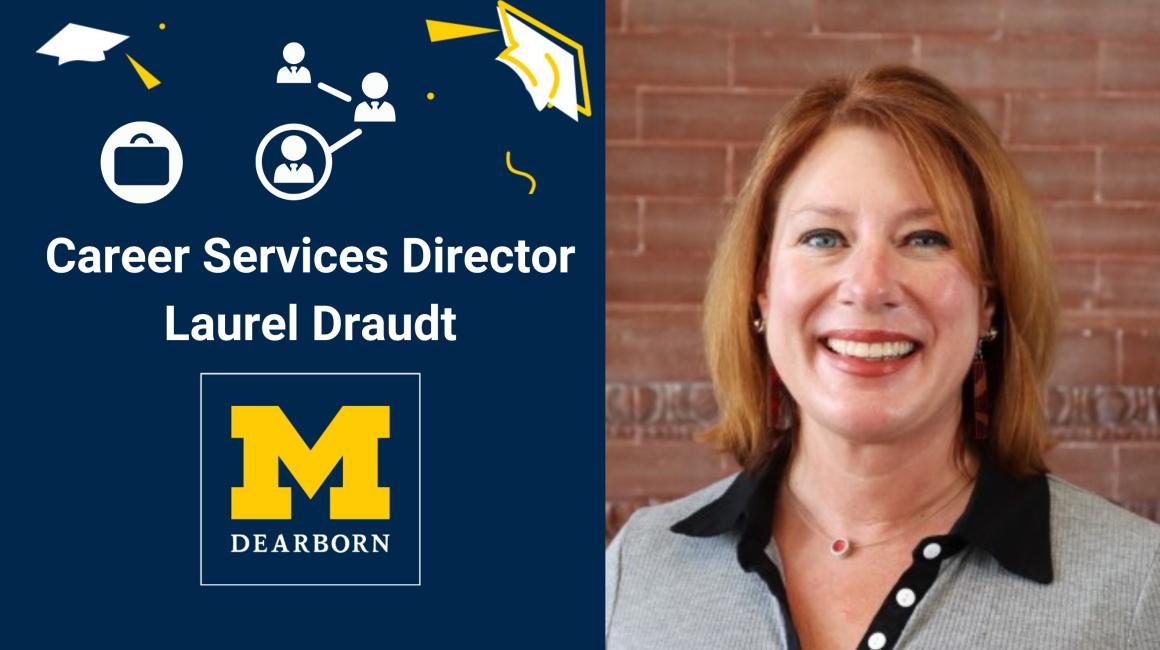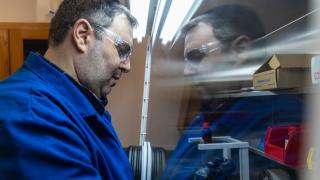
Career Services Director Laurel Draudt shows UM-Dearborn students how to use LinkedIn, asks them about their interests and connects them to professionals.
The new director is a natural — balancing a friendly demeanor with a no-nonsense approach to get students started on paths to reach their goals.
She credits her childhood experiences living in Columbus, Ohio, and the people in her life for shaping her personally and professionally. And Laurel hopes what she brings to UM-Dearborn will help students build upon their lived experiences and lead them to successful outcomes.
Get to know UM-Dearborn’s Career Services director, who started in December, and how her 20-plus years of student development experiences will benefit Dearborn Wolverines.
Prior to UM-Dearborn, she directed an academic and career support institute and focused on helping underserved students.
At Albion College, where Draudt served for a decade, she helped guide hundreds of students in the Carl A. Gerstacker Institute for Business and Management. There, students were required to complete an internship and — in some cases — two. To prepare students for their out-of-classroom experiences, she advised them, visited students on site and often helped them as they transitioned to their first job.
She also enjoyed collaborations that focused on providing underserved students with added assistance when it came to foundational professional skills like writing, communication and critical thinking. “We had a lot of inner-city Chicago students and many were PELL-eligible, first-generation students. Higher education access isn’t enough. There also needs to be an additional level of support so we can approach students and their needs holistically,” she said. “If they aren’t getting a college prep education in their high schools, we need to help them when they get to college to grow confidence, get connected and give them a strong foundation to build on.”
She did this through individualized conversations with students and exploring personal and professional goals. Afterwards, she’d connect them to successful alumni mentors, faculty experts in their fields of interest and other campus resources.
If you are a faculty member and want Laurel to speak to your class or connect with her, reach out to ldraudt@umich.edu.
Her educational approach is to give an information overload — and then let the students decide what comes next.
Laurel went to a small liberal arts college on a PELL grant and financially put herself through college. This required working in various campus employment positions in student life and admissions and returning home in the summers working 40-70 hours a week.
She focused on completing her degree, but wasn’t exactly sure what she wanted to do. Then, two days prior to her commencement, the Spanish major learned about a classmate who planned on attending graduate school to study higher education. “I thought: ‘That’s what I want to do.’ But, prior to that moment, I didn’t even know it was something people could do. I hadn’t applied to graduate school and I wasn’t sure how I’d even pay for it.”
At the advice of a family friend, Laurel applied for and landed an entry-level position at the Ohio State University’s Moritz College of Law Admissions Office. OSU had a Higher Education and Student Affairs graduate program and offered tuition assistance — five years later, while working full time for four years and as a graduate assistant for one, Laurel earned her master’s degree.
“It worked out, but it would have been nice to have had some of that insight when I was an undergraduate student,” she said. “So I’m driven by helping people better understand all the options they have in front of them.”
People start college as adults, but it’s something that is often decided way before that.
“Growing up in an inner-city school system, I was introduced to the differences between the socioeconomic statuses around me; myself experiencing financial challenges and instability at times,” Laurel said. But Laurel also realized that she had support that some of her classmates didn’t have, including parents who often spoke of their expectation that their children would go to college.
Through a course as a grad student at OSU, Laurel learned more about the importance of that support when talking to elementary-aged students. “Children tend to know whether they will attend college or not very early on. It’s something that is just part of their day-to-day culture. They see people wearing college jerseys or sweatshirts, hear adults talk about their college experiences or have people ask them where they plan to go. Just hearing that expectation or having familiarity with a college makes a difference. Not all children have that.”
Laurel said that’s why it’s important for universities to be active in their communities. “College may not be for everyone, but I do want kids to know what their options are if they want to continue their education beyond high school.”
She has a favorite social media channel.
Yes, it’s LinkedIn.
To create meaningful connections for her students, Laurel is on the social platform daily and says it has a lot of helpful features for both seasoned professionals and people seeking entry-level opportunities. The key? “Keep your profile up-to-date — and network,” she said. “LinkedIn really is an easy way to teach students how to reach out to people. Not only can you look up alumni for specific institutions, but you can also filter by graduation year, industry and location. So it’s an easy way to find other people who have once been where you are and have similar professional interests.”
Laurel already feels connected to campus and its students.
Laurel said she’s had a variety of student-focused roles while working at campuses that include OSU, University of Arkansas, UM-Ann Arbor and Albion College.
Spending half of her career at large research one (R1) universities, and the other half at a small liberal arts college, she wanted to work where students had the best of both. “UM-Dearborn is big — but it’s not 50,000 students. It has strong programs for students like the Talent Gateway, which really puts it ahead of the curve — that’s one area where colleges are currently trying to go; towards professional development and helping students to be ready for their careers.”
In addition to finding the Career Services initiatives impressive and seeing that the role was a good fit, she was attracted to campus because of the students. Laurel said she’s aware that UM-Dearborn students juggle their academics while taking care of their families, paying their own way through college and other challenging situations. “UM-Dearborn students aren't afraid of hard work. I’m glad to be here because, in many ways, I feel these are my people.”
Article by Sarah Tuxbury.


